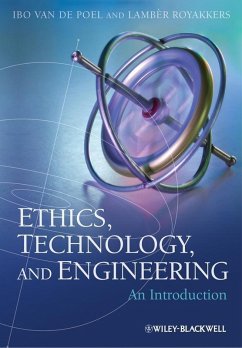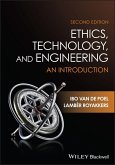Featuring a wide range of international case studies, Ethics, Technology, and Engineering presents a unique and systematic approach for engineering students to deal with the ethical issues that are increasingly inherent in engineering practice. * Utilizes a systematic approach to ethical case analysis -- the ethical cycle -- which features a wide range of real-life international case studies including the Challenger Space Shuttle, the Herald of Free Enterprise and biofuels. * Covers a broad range of topics, including ethics in design, risks, responsibility, sustainability, and emerging technologies * Can be used in conjunction with the online ethics tool Agora (href="http://www.ethicsandtechnology.com/">http://www.ethicsandtechnology.com) * Provides engineering students with a clear introduction to the main ethical theories * Includes an extensive glossary with key terms
Dieser Download kann aus rechtlichen Gründen nur mit Rechnungsadresse in D ausgeliefert werden.
"Ethics, Technology, and Engineering: An Introduction is agenuine contribution to an already substantial literature on ethicsin the techno-lifeworld. Arising from within a world where humanslive more intensely integrated with and thoughtfully reliant ontechnology than anywhere else on the planet, this volumeconstitutes a new realization of historico-philosophicalpromise."
--Carl Mitcham, Colorado School of Mines
"Ethics, Technology, and Engineering takes undergraduateeducation in engineering ethics to a new level. It shows whyengineers need to reflect seriously on ethics, and provides themwith the tools they need to do so. This is exactly what we need toteach ethics to engineers."
--Sven Ove Hansson, Royal Institute ofTechnology, Sweden
"Van de Poel and Royakkers have written a most comprehensive,up-to-date, and readable text. Their discussion of the differentgrounds for, and ways of framing, moral problems likely to beencountered in engineering covers all the bases; their illustrativecases, drawn in the main from contemporary practice, are treatedcircumspectly and will no doubt provoke the kind of open discussionof engineering decision-making they intend. It is the besttreatment of this subject geared toward the undergraduate I haveencountered."
--Louis L. Bucciarelli, MIT
--Carl Mitcham, Colorado School of Mines
"Ethics, Technology, and Engineering takes undergraduateeducation in engineering ethics to a new level. It shows whyengineers need to reflect seriously on ethics, and provides themwith the tools they need to do so. This is exactly what we need toteach ethics to engineers."
--Sven Ove Hansson, Royal Institute ofTechnology, Sweden
"Van de Poel and Royakkers have written a most comprehensive,up-to-date, and readable text. Their discussion of the differentgrounds for, and ways of framing, moral problems likely to beencountered in engineering covers all the bases; their illustrativecases, drawn in the main from contemporary practice, are treatedcircumspectly and will no doubt provoke the kind of open discussionof engineering decision-making they intend. It is the besttreatment of this subject geared toward the undergraduate I haveencountered."
--Louis L. Bucciarelli, MIT









